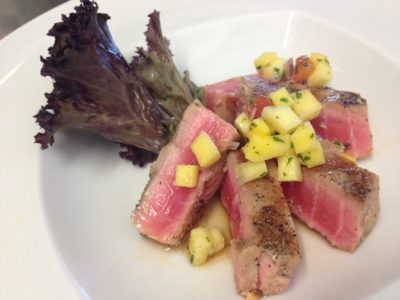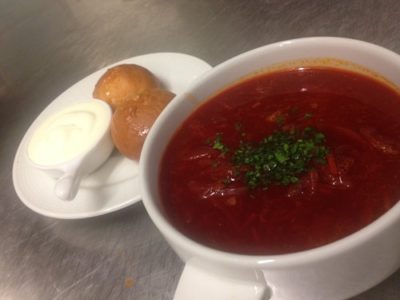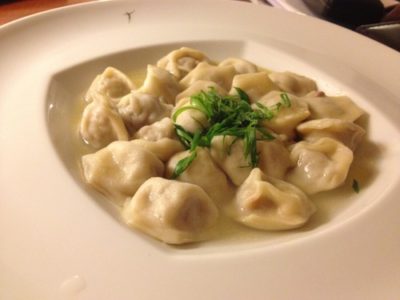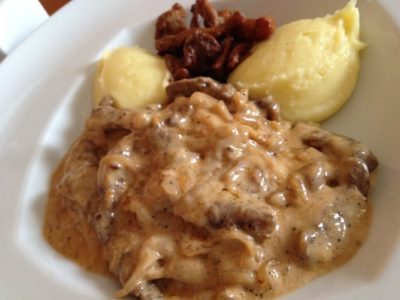
My first 7 days in Moscow would be busy ones as I, along with Moscow-based Filipino chef Ronnie Reduta, was tasked to cook a couple of Filipino buffets and then cook for the special Filipino a la carte menu in Cafe Swiss of Swissotel. I’m proud to say that Ronnie and I developed a quick camaraderie and we were able to churn out food the country can be proud of. Among the highlights were my Grilled Tuna with Green Mango Salsa, which one Russian VIP called, “The best fish she ever tasted,” and Chef Ronnie’s Sea Bass with Coconut Milk Sauce, which had one Russian VIP calling it, “Something I’ve never imagined.” We were also honored to do a “Master Class,” demonstrating to the diplomatic corps in Moscow quick recipes like Rellenong Sugpo, Shrimp Inasal and Turon.
Enough about our exploits, though. One of the perks of doing a food promotion in a hotel is they let you eat in their restaurants free, including room service. While I always want to eat local food away from hotels, my difficulty with the language during my first night convinced me to temporarily relax my travel rules. Turns out, it was a pretty good decision, as I got to taste the “Big Three” of Russian cuisine. Well, “Big Three” in my book at least.

Borsch was one of the things I promised myself I would have, come hell or high water, and I was lucky enough to actually witness the staff cooking it while I was cooking there. The chefs there let me taste some. I loved it so much I ordered it the next day through room service. Borsch is a beef soup which has beets, carrots and potatoes and it’s served with sour cream. I asked the chefs if they made it more upscale and “sosyal” (of course I didn’t use the word “sosyal”) and they shook their head. Nobody in their right mind messes with Borsch, so what I was having was as traditional as traditional gets. The soup is hearty with some sour notes and by adding sour cream, there is a tremendous balance of richness and lightness. Turns out, they cook the beets with a bit of vinegar before adding it to the soup and that accounts for the hint of sourness. It was, in my mind, a tremendous example of comfort food, perfect for me as I ended a particularly long day in the kitchen. Later on, I realized why it gave me comfort. Take out the beets, and it’s your nilagang baka.

The one national dish I had never heard of was Pelmeni, and I seized the chance to order it the following day. Pelmeni is basically Russian ravioli usually served with a chicken broth with some dill, accompanied by sour cream. I was told that sometimes, it’s served fried, but I was unlucky not to meet this incarnation. The one I had was veal and lamb but the filling varies according to region and the chef. It was quite a dish and I loved it! The broth was very subtly flavored and the pelmenis has a good filling to dough ratio. The meat in the filling was very flavorful and juicy, almost like a Xiao Long Pao (soup dumpling). Again, it brought this sense of hominess and it figures since this is one of those “Grandma” dishes, where most families’ grandmothers would have a personal recipe of. I call it a Russian Molo Soup, which is very high praise for me, since I love Molo. A lot. Did I say a lot? A lot.

Another of the “Big Three” I promised I would taste or die trying, was Beef Stroganoff. After a quick check on whether it was truly Russian or not (you never know), I got a quick confirmation from Chef Ivan of Cafe Swiss on how to make it. Nora Daza’s cook book has a pretty accurate recipe, it turns out. Beef strips are seared and then topped with a sauce containing flour, onions, mushrooms and sour cream (sense a pattern?) and it’s served with potatoes. When I asked if it were served with noodles, Ivan paused and paused and then proceeded to talk about how noodles “could be used,” but “We serve it with mashed potatoes.” It was awesome. Sirloin beef was seared well to medium and it was very tender. The sauce was rich and creamy and the onions brought a nice sweetness that contrasted well to the sour cream. Cafe Swiss used Chantrelle mushrooms, which may not be traditional, but I am not complaining.